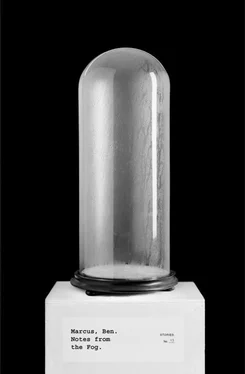So it wasn’t the girl in particular, was it? Maybe the father would do, or the mother, or, if it were possible, ancestors going back further, if you could arise out of where you lived and drift into the past, to make selections. Because the attraction—even though that was the wrong word, really—was just the cells, and the blood. A precise arrangement of them, regardless, really, of the carrier, rendering her face and body just so. Maybe the girl herself didn’t matter, even if she seemed to hold a more concentrated level, as if a strong dose of it had funneled down into her for the time being. He couldn’t ignore that. He’d be lying to himself. What would he want from her as an old woman? It was a problem.
The tools didn’t really exist for him to scrape what he needed into a bottle.
—
“Marjorie,” the womancalled over to Fowler’s wife. “Hey, Marjorie, I caught myself a big one!” She’d grabbed Fowler now and he started to sway, eating his sausage again, trying to smile in just the right way for the guys.
The other wives looked down and laughed. The laughing had changed. It didn’t make him feel good to hear someone say his wife’s name. It never had. Early on, when they were first just getting to know each other and he hoped to show her some of the paths in the foothills, before they had embarrassed each other with nudity, he wondered if that meant they should not be married. Her name wasn’t entirely her fault.
Marjorie was nearby, in a circle of people, and she didn’t seem to immediately notice she was being called out. When he saw her he could tell she didn’t want to look up—she had on her do not disturb face. She’d be gone in three months, leaving with no argument, the two of them nearly shaking hands. He wanted to keep these people from bothering her. But she looked over at them anyway.
“What do you say?” the wife asked, pointing her finger right into Fowler’s body. “Is this one ticklish? Your husband! Is he?”
Marjorie shrugged, and it was like they all suddenly felt the same thing, with this woman’s finger pressing into Fowler, as if she knew what she was looking for, when really she had her hand in something she should not be touching. The group quickly fell quiet. Maybe each of them, in their own way, was picturing themselves being launched off the street, as Fowler was, and propelled high up into the air, then rapidly hurtling through space. Their faces spreading in the wind as it rushed by them, and all of them looking down at their whole neighborhood, where everything had turned so small. Killable, dismissible, unreal. There wasn’t really such a good word for how it all looked from up there where he was.
—
Now Fowler was outin the neighborhood, just where the block party was a year ago, and everyone was gone, evacuated. He could do what he liked. The streets were empty. Yesterday some vehicles had lifted in the muck and floated off. The biggest things, in the right weather, were suddenly weightless, beautiful. Should not people, on occasion, float past one another, weightless and rolling? The problem with the laws of physics was repetition, dullness. There was a kind of deep insult buried in the way the world was designed.
Pretty much everything was hidden by a rumbling flow of mud. Some houses were seeing damage.
Mud, they all knew by now, because you heard it on the news every time the rain started, slid down from Moyer Creek, which nearly ringed the town from above. Nearly. From space the creek might look like a broken circle, a circle with a tear in it, where some beast had maybe broken through. But today you couldn’t really look into the hills and think the mud was coming from just one place anymore. Someone long ago had named the area a basin. Not a scientific term. In the neighborhood they called it a bucket because it did fill right up.
Stupid to put houses in it. Stupid to put people there. True of any place if you took the long view. Pretty much any location anywhere featured its own notable extinction. Sudden death. But people did not exactly get to see a list, for example, of all the people who had died in the place they were thinking of living. Plus how they died, going back a good enough ways to give them the picture they really were entitled to have. Probably it would be unbearable to know. Who died here. And here. And here. How they died. When they died. Probably no one would care to know. But still, freedom of information. If you felt yourself to be strong enough, you should be allowed to know.
There was probably an ocean here long ago. And before that, what, maybe hot plains, they said, too hot even to stand on. Jungle, too. Sharp beds of coal. A meadow of knives, Fowler had read somewhere.
Fowler had to figure that, throughout history, one animal had hunted another in this very spot. What were the larger observations one could make, in terms of who escaped, who was caught, who was eaten? You could think that you walked down the street in your town, but you didn’t. You participated in something else entirely.
A chart depicting every creature who passed this way, going back to the beginning. Did they know they were in danger? Did they intend harm to others?
—
When he got tothe girl’s house, it didn’t take him long. Her bedroom was off the kitchen, and not upstairs with the other bedrooms. Nobody was home, but Fowler couldn’t help calling out. He instantly regretted it. What if there was a recording instrument? They’d have captured his voice. Except, nonsense. That was nonsense and he knew it. In the entryway, dripping mud, he debated between boots or socks. Which sort of footprints were called for? A pair of clogs in the shoe rack solved the problem. Belonging to the girl’s father, no doubt, owing to their size. Perhaps for gardening, or cooking. He pushed his mud-caked feet into them, then clomped to the girl’s bedroom, the same way her father must have done many, many times.
—
It had takena little bit of hiding to be able to stick around yesterday, when the patrols came through on bullhorns. Men at the door pounding away. Everyone barking in animal voices. You shouldn’t have to take cover in your own house. But the county had learned its lesson from last time, when no one got out, no one was scared enough, no one wanted to be troubled.
It was last year’s flood that had them all crazy. The bunch of little people they’d lost to it, just around the corner from here. The Larsen boys and their friend whose name Fowler always forgot. Everyone acted like their own children had died. You had to be prepared to discuss the matter, and be silent about it, too, when that was called for. So no one was fooling around this time. They were going to scoot off and play it safe.
Not him, though. A couple of items could get scratched off his to-do list if he sat this one out and had the place to himself. He’d squatted under a window for most of the day, crawling here and there for supplies, and clocked a good bit of the mayhem going on outside.
—
Today at the girl’s houseFowler found a backpack to stash the stuff in. If the girl cared for the backpack, which he figured she must, since it was on her bed, then that was one more thing she’d be pleased to see.
If he got her up to the hut, if that was something that would ever really happen. After he’d solved some of the logistics. Acquisition. Transport. If the hut was even there anymore. So far, when he pictured it, he could not summon any shapes out of the darkness. The visualization was proving difficult. One’s imagination often failed.
Fowler walked home, the backpack raised over his head. He was careful not to get anything dirty, impossible as that was. If anyone came along, it’d be a sorrow, but he could sink the backpack into the mud. Objects like that seemed to reappear in the girl’s room over time, in different colors and shapes, so he could always fetch them again, but, well.
Читать дальше











